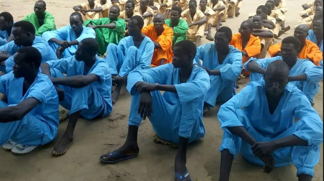Tambura County Prison is facing a dire humanitarian crisis, with over 80 inmates reportedly going without food for 11 consecutive days due to a government failure to pay a long-standing debt to the penitentiary’s food supplier.
Colonel Gaetano Angelo Barasa, the Director of Tambura County Prison, told Radio Tamazuj that the prison’s food contractor halted supplies after nearly a year of unpaid dues. As a result, authorities have resorted to sending inmates out for casual labor to earn money for food.
“We have had no food for 11 days. The contractor stopped supplying because they have not been paid since last year,” he explained. “I have been forced to send inmates out to do casual work so they can buy food.”
Col. Barasa further revealed that the prison lacks transportation, making it difficult for inmates to farm or collect firewood, alternative means of generating food or income.
Currently, Tambura Prison holds 80 inmates, including 14 facing murder charges, many of whom are awaiting trial due to the absence of a resident judge in the county.
Tambura County Commissioner Mathew Mabenge confirmed the food shortage, attributing it to ongoing insecurity that has plagued the region since 2021. He said that farming activities have been severely disrupted and that humanitarian organizations that previously supported the prison have since withdrawn their support.
“The inmates are suffering, there is no food, and we need urgent intervention,” said Commissioner Mabenge. “We also need agricultural tools, seeds, and proper prison infrastructure to help inmates survive and live with dignity.”
He called on both the state and national governments to urgently address the food shortage affecting not only inmates but also the wider community and soldiers stationed in the region.
Acting Paramount Chief Thomas Bandaisa of Tambura County also confirmed the critical situation, emphasizing that while inmates are separated by gender, all are enduring the same hunger crisis.
“Food is the biggest problem. Even the soldiers are going hungry,” Chief Bandaisa said. “Tambura Prison is currently hosting inmates from Tambura, Ezo, and Nagero counties, putting further strain on our limited resources.”
Prominent civil society activist Edmond Yakani called on the Western Equatoria State Acting Governor, members of parliament, and the commissioner of Tambura to take immediate action. He warned that the overcrowded and deteriorating conditions in the prison could trigger a health outbreak.
“The situation in Tambura is alarming. If any disease outbreak happens, we could lose many lives,” said Yakani. “This is not only a Tambura issue—it reflects the broader crisis in prisons across South Sudan.”
He urged the Ministry of Interior, the Inspector General of Police (IGP), and the President of South Sudan to take responsibility by constructing new prison facilities, improving prison conditions, and ensuring that inmates’ rights are respected.
“Detainees deserve an adequate standard of living, and we must act now to prevent a disaster,” Yakani added.
Local leaders and civil society are jointly appealing to the government and international humanitarian agencies to provide emergency food supplies and long-term institutional support to stabilize prison operations and uphold human dignity.




